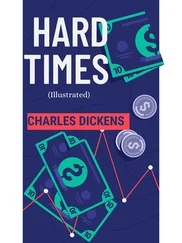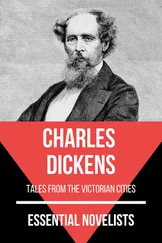“I'm sorry to interfere with your plans,” said Bitzer, shaking his head, “but I can't allow myself to be done by horse-riders. I must have young Mr. Tom; he mustn't be got away by horse-riders; here he is in a smock frock, and I must have him!”
By the collar, too, it seemed. For, so he took possession of him.
CHAPTER VIII
PHILOSOPHICAL
THEY went back into the booth, Sleary shutting the door to keep intruders out. Bitzer, still holding the paralysed culprit by the collar, stood in the Ring, blinking at his old patron through the darkness of the twilight.
“Bitzer,” said Mr. Gradgrind, broken down, and miserably submissive to him, “have you a heart?”
“The circulation, sir,” returned Bitzer, smiling at the oddity of the question, “couldn't be carried on without one. No man, sir, acquainted with the facts established by Harvey relating to the circulation of the blood, can doubt that I have a heart.”
“Is it accessible,” cried Mr. Gradgrind, “to any compassionate influence?”
“It is accessible to Reason, sir,” returned the excellent young man. “And to nothing else.”
They stood looking at each other; Mr. Gradgrind's face as white as the pursuer's.
“What motive—even what motive in reason—can you have for preventing the escape of this wretched youth,” said Mr. Gradgrind, “and crushing his miserable father? See his sister here. Pity us!”
“Sir,” returned Bitzer, in a very business-like and logical manner, “since you ask me what motive I have in reason, for taking young Mr. Tom back to Coketown, it is only reasonable to let you know. I have suspected young Mr. Tom of this bank-robbery from the first. I had had my eye upon him before that time, for I knew his ways. I have kept my observations to myself, but I have made them; and I have got ample proofs against him now, besides his running away, and besides his own confession, which I was just in time to overhear. I had the pleasure of watching your house yesterday morning, and following you here. I am going to take young Mr. Tom back to Coketown, in order to deliver him over to Mr. Bounderby. Sir, I have no doubt whatever that Mr. Bounderby will then promote me to young Mr. Tom's situation. And I wish to have his situation, sir, for it will be a rise to me, and will do me good.”
“If this is solely a question of self-interest with you—” Mr. Gradgrind began.
“I beg your pardon for interrupting you, sir,” returned Bitzer; “but I am sure you know that the whole social system is a question of self-interest. What you must always appeal to, is a person's self-interest. It's your only hold. We are so constituted. I was brought up in that catechism when I was very young, sir, as you are aware.”
“What sum of money,” said Mr. Gradgrind, “will you set against your expected promotion?”
“Thank you, sir,” returned Bitzer, “for hinting at the proposal; but I will not set any sum against it. Knowing that your clear head would propose that alternative, I have gone over the calculations in my mind; and I find that to compound a felony, even on very high terms indeed, would not be as safe and good for me as my improved prospects in the Bank.”
“Bitzer,” said Mr. Gradgrind, stretching out his hands as though he would have said, See how miserable I am! “Bitzer, I have but one chance left to soften you. You were many years at my school. If, in remembrance of the pains bestowed upon you there, you can persuade yourself in any degree to disregard your present interest and release my son, I entreat and pray you to give him the benefit of that remembrance.”
“I really wonder, sir,” rejoined the old pupil in an argumentative manner, “to find you taking a position so untenable. My schooling was paid for; it was a bargain; and when I came away, the bargain ended.”
It was a fundamental principle of the Gradgrind philosophy that everything was to be paid for. Nobody was ever on any account to give anybody anything, or render anybody help without purchase. Gratitude was to be abolished, and the virtues springing from it were not to be. Every inch of the existence of mankind, from birth to death, was to be a bargain across a counter. And if we didn't get to Heaven that way, it was not a politico-economical place, and we had no business there.
“I don't deny,” added Bitzer, “that my schooling was cheap. But that comes right, sir. I was made in the cheapest market, and have to dispose of myself in the dearest.”
He was a little troubled here, by Louisa and Sissy crying.
“Pray don't do that,” said he, “it's of no use doing that: it only worries. You seem to think that I have some animosity against young Mr. Tom; whereas I have none at all. I am only going, on the reasonable grounds I have mentioned, to take him back to Coketown. If he was to resist, I should set up the cry of Stop thief! But, he won't resist, you may depend upon it.”
Mr. Sleary, who with his mouth open and his rolling eye as immovably jammed in his head as his fixed one, had listened to these doctrines with profound attention, here stepped forward.
“Thquire, you know perfectly well, and your daughter knowth perfectly well (better than you, becauthe I thed it to her), that I didn't know what your thon had done, and that I didn't want to know—I thed it wath better not, though I only thought, then, it wath thome thkylarking. However, thith young man having made it known to be a robbery of a bank, why, that'h a theriouth thing; muth too theriouth a thing for me to compound, ath thith young man hath very properly called it. Conthequently, Thquire, you muthn't quarrel with me if I take thith young man'th thide, and thay he'th right and there'th no help for it. But I tell you what I'll do, Thquire; I'll drive your thon and thith young man over to the rail, and prevent expothure here. I can't conthent to do more, but I'll do that.”
Fresh lamentations from Louisa, and deeper affliction on Mr. Gradgrind's part, followed this desertion of them by their last friend. But, Sissy glanced at him with great attention; nor did she in her own breast misunderstand him. As they were all going out again, he favoured her with one slight roll of his movable eye, desiring her to linger behind. As he locked the door, he said excitedly:
“The Thquire thtood by you, Thethilia, and I'll thtand by the Thquire. More than that: thith ith a prethiouth rathcal, and belongth to that bluthtering Cove that my people nearly pitht out o” winder. It'll be a dark night; I've got a horthe that'll do anything but thpeak; I've got a pony that'll go fifteen mile an hour with Childerth driving of him; I've got a dog that'll keep a man to one plathe four-and-twenty hourth. Get a word with the young Thquire. Tell him, when he theeth our horthe begin to danthe, not to be afraid of being thpilt, but to look out for a pony-gig coming up. Tell him, when he theeth that gig clothe by, to jump down, and it'll take him off at a rattling pathe. If my dog leth thith young man thtir a peg on foot, I give him leave to go. And if my horthe ever thtirth from that thpot where he beginth a danthing, till the morning—I don't know him?—Tharp'th the word!”
The word was so sharp, that in ten minutes Mr. Childers, sauntering about the market-place in a pair of slippers, had his cue, and Mr. Sleary's equipage was ready. It was a fine sight, to behold the learned dog barking round it, and Mr. Sleary instructing him, with his one practicable eye, that Bitzer was the object of his particular attentions. Soon after dark they all three got in and started; the learned dog (a formidable creature) already pinning Bitzer with his eye, and sticking close to the wheel on his side, that he might be ready for him in the event of his showing the slightest disposition to alight.
Читать дальше
Конец ознакомительного отрывка
Купить книгу












